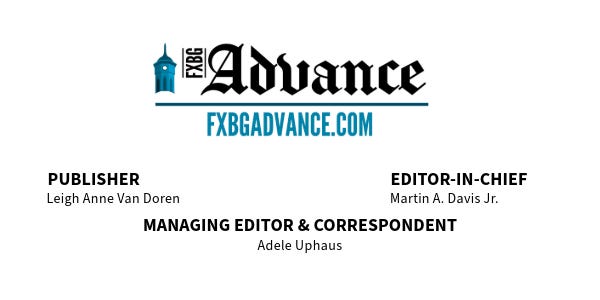
By Dr. Joseph Ferguson
GUEST COLUMNIST
Editor’s Note: The Advance is pleased to launch this new series focused on readers’ health. These columns by local medical professionals offer insights and advice on a range of medical topics. The opinions or views expressed in these columns are not intended to treat or diagnose; nor are they meant to replace the treatment and care that you may be receiving from a licensed professional physician or mental health professional.
There is a good chance that you have not gotten the one screening test that you need the most. Almost every person age 40 and over should get the CT calcium score test and the vast majority of those people have never gotten the test.
The CT calcium score is a CT scan of the chest focused on measuring the amount of calcium in the coronary arteries of the heart.
Calcium is not the problem; it is a marker for the problem. In other words, calcium makes it possible for the CT scanner to see the problem. Blockage or “plaque” in those coronary arteries is the problem, and if that plaque has been there for a long time, it is likely to have been infused with calcium. CT scanners are excellent at picking up on calcium.
When we do that CT scan, we get a number, a “score,” that tells us precisely how much calcium is in those arteries, which gives us a really good idea of what’s going on in those arteries.
Subscribed
So why is the CT calcium score the most important of all screening tests? Because there really is no substitute for actually taking a look.
We doctors put a lot of effort into making educated guesses about what might be going on with people’s blood vessels. We check blood pressures. We ask about risk factors like tobacco use and whether people in the family tend to have heart attacks. We do blood tests looking at blood sugar averages, inflammatory markers and cholesterol profiles, and maybe we even do super-specialized tests looking at the size and density of the cholesterol particles, because it’s the small, dense ones that cause the most trouble.
The way I see it, we doctors spend a lot of time, money and effort trying to make educated guesses, and that’s good and all. I mean, educated guesses are certainly better than uneducated ones.
But do we ever reach a point where we want to stop all the guessing and actually just take a look?
I’m all in favor of risk assessment through blood pressure measurement, history-taking, and blood tests. I’m hardcore about making sure all those assessments are done, and frequently. But in my mind, the primary value of those assessments is that they allow us to make educated guesses about what a CT calcium score test would show. So instead of more and more education for our guessing, why not just do the test and eliminate the guesswork?
Actually, unfortunately, there is a powerful reason for a lot of people not to get the test: It costs $180 and there is no insurance company that pays for it. So all 180 of those dollars are going to have to be coughed up by the patient.
I get it. $180 is not chump change. I have plenty of patients who have to work their butts off just to come up with the $30 copay for seeing me.
So if $180 is not doable right now, keep the test in the back of your mind. When the day arrives where spending $180 is realistic, go ahead and get the test.
The only other situation where getting a CT calcium score wouldn’t necessarily be a good idea would be if you are already seeing a cardiologist and getting catheterizations. The cardiologist, during catheterization, snakes a thin tube, from an artery in your groin, all the way up and into your coronary arteries and then shoots dye into those arteries while looking at your heart on an x-ray TV monitor. That procedure offers a much clearer picture of the coronary arteries than is possible with the CT calcium score.
I imagine that a lot of you readers are wondering certain things right now.
If this test is so important, why have neither my primary care doctor nor my cardiologist ever mentioned it?
A small minority of doctors don’t believe in the CT calcium score because the tests don’t measure the plaque that is not yet calcified.
Imagine your eyes are tightly shut and you are forced to wear dark sunglasses as you are trying to make your way around a dimly lit room. Would you say to yourself that you won’t open your eyes because, if you did so, your vision would be reduced by the glasses? Or would you open your eyes and see things in the best way that you can?
Not seeing the plaque that is not yet calcified is a serious limitation of the CT calcium score in taking a look at the coronary arteries, but it is not a reason not to take a look.
There is another possible reason why your doctors may have never told you about the CT calcium score test, and I believe this reason is the primary one keeping doctors from ordering the test.
We doctors don’t like to order tests that are not covered by insurance companies. Maybe some of us consider it a failing if we can’t get an insurance company to pay for the test we order.
But we really have no excuse for not telling people about this test. The patient should be the one who decides whether $180 is doable for a test that may well prove to be life-saving.
Here is a final question that I imagine readers are asking at this point: Are we just doing the CT calcium score test out of curiosity? Am I just getting this test as a way to potentially increase my health worries?
The answer to both questions is no. We are doing the test to guide our shared healthcare decision-making.
If one of my patients has a worrisome CT calcium score, I will order an ultrasound looking for the extent of plaque in their neck arteries; I will order an ultrasound of their abdominal aorta looking for evidence of plaque and/or aneurysm; I will order an ultrasound to evaluate the arteries carrying blood to their legs and I will order the measuring of their blood pressures in all four of their limbs. The patient will get a stress test to evaluate whether any of their coronary arteries are so full of plaque that they are at risk of an imminent heart attack. They will get an echocardiogram (ultrasound of the heart) to detect any problems with their valves or the four chambers of their heart. I will have them see a cardiologist who will determine whether they need a cardiac catheterization which could lead to stent placement or bypass surgery.
And I will try to convince them to allow me to put them on aggressive doses of medicine that will not only reduce their plaque but will stabilize that plaque. Heart attacks happen when an unstable plaque ruptures, forming a blood clot. Plaque that is shrinking is much more stable and much less likely to rupture.
I have been ordering CT calcium score tests and using aggressive medication doses for a very long time.
In this country, average levels of LDL (“bad cholesterol”) are about 110, and that includes all the people on cholesterol medication. For people at high risk of heart attack (especially those who have already had heart attacks and those who have already had stents placed or bypass surgery) I keep cranking up medication doses with the goal of getting the LDL down to about 35.
Patients of mine on aggressive medication doses who have high CT calcium scores are actually seeing their CT calcium scores decrease year by year. And even though many of those people have severe cardiovascular disease with extremely high CT calcium scores, I have yet to see a heart attack in one of my patients whose CT calcium scores are decreasing.
In addition to all that I have already stated, I should not fail to mention that the CT calcium score involves a full CT scan of the chest. In my patients, twice the test has shown lung cancer. For both of those people, the cancer was caught very early and the CT calcium score test may well have saved their lives.
The CT calcium score test is for a lot of people, but it’s not for everyone. If you have never had the test before, I encourage you to discuss it with your primary care doctor and/or your cardiologist.
Joseph Ferguson, MD, is a graduate of The John’s Hopkins School of Medicine. He founded Fredericksburg Primary Care 20 years ago and he has operated that clinic ever since.





Local Obituaries
To view local obituaries or to send a note to family and loved ones, please visit our website at the link that follows.

Support Award-winning, Locally Focused Journalism

The FXBG Advance cuts through the talking points to deliver both incisive and informative news about the issues, people, and organizations that daily affect your life. And we do it in a multi-partisan format that has no equal in this region. Over the past month, our reporting was:
$8 a month supports great journalism
- First to report on a Spotsylvania School teacher arrested for bringing drugs onto campus.
- First to report on new facility fees leveled by MWHC on patient bills.
- First to detail controversial traffic numbers submitted by Stafford staff on the Buc-ee’s project
- Provided extensive coverage of the cellphone bans that are sweeping local school districts.
- And so much more, like Clay Jones, Drew Gallagher, Hank Silverberg, and more.
For just $8 a month, you can help support top-flight journalism that puts people over policies.
Your contributions 100% support our journalists.
Help us as we continue to grow!
Support FXBG Advance for $8 a month







